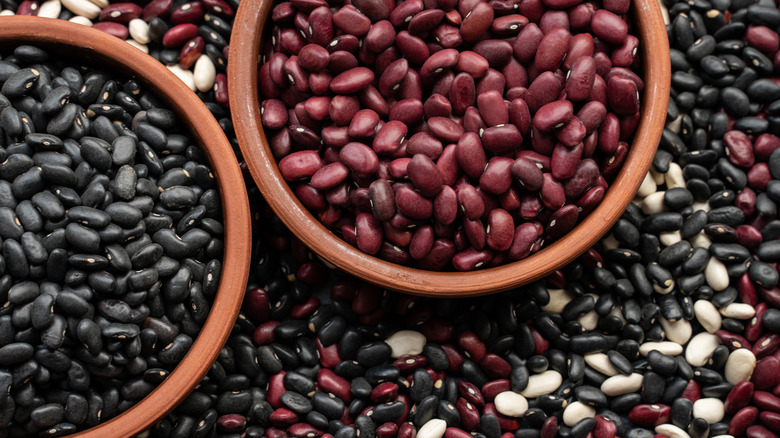Men Should Start Eating This To Get More Fiber In Their Diet
Looking for the best ways to get more fiber in your diet? For starters, fill up on leafy greens and legumes. A cup of cooked green peas boasts more than one-third of the daily recommended fiber intake, according to My Food Data. Artichokes, collard greens, parsnips, kale, broccoli, and spinach are all rich in this nutrient. On top of that, they deliver large doses of iron, magnesium, calcium, B vitamins, and antioxidants — but how much fiber do you really need?
The Harvard Medical School recommends about 25 grams of dietary fiber per day for women under 50 years old, and 38 grams for men in the same age range. Experts note it's better to get this nutrient from whole foods rather than supplements. A high-fiber diet can make it easier to manage cholesterol and blood sugar levels, among other benefits. Over time, it may lower your risk of obesity, heart disease, diabetes, and even cancer. However, most Americans only eat 10-15 grams of fiber per day, which is less than half of the recommended intake.
If you're a man, you may find it difficult to get enough of this nutrient. Steak, fish, cottage cheese, and other animal-derived foods are chock-full of protein, but have no fiber. Most fruits and vegetables, on the other hand, contain little or no protein. So, what should you eat to meet your daily fiber requirements without sacrificing protein, the building block of muscle tissue? The answer is simpler than you think.
Fill up on beans to boost your fiber intake
A cup of cooked lima beans delivers 11.6 grams of protein and 40 grams of complex carbs, including 9.2 grams of fiber (via My Food Data). Plus, it has only 209 calories and provides large doses of iron, calcium, potassium, phosphorus, and magnesium. Black beans are even more nutritious, offering 15 grams of plant-based protein and 15 grams of fiber per cup. That's nearly half of the recommended daily fiber intake for men!
These legumes may protect against diabetes and heart disease, according to the UMass Chan Medical School. Due to their high protein and fiber content, beans also fill you up quickly and facilitate weight loss. You can even use them as a substitute for meat. Kidney beans, black beans, and pinto beans pack more fiber than other varieties and can be a healthy addition to most diets.
The UMass Chan Medical School recommends eating at least 2-3 servings of beans per week. One serving equals a half-cup of cooked beans. However, try not to exceed 70 grams of fiber per day (per Duke University). Too much fiber, whether it comes from beans or other foods, may cause bloating, indigestion, and mineral deficiencies. It can also reduce appetite, making it difficult to meet your daily nutritional needs.
Opt for dried beans, or rinse canned beans before you cook them. Canned varieties tend to be high in sodium, which may lead to increased blood pressure and fluid retention.


